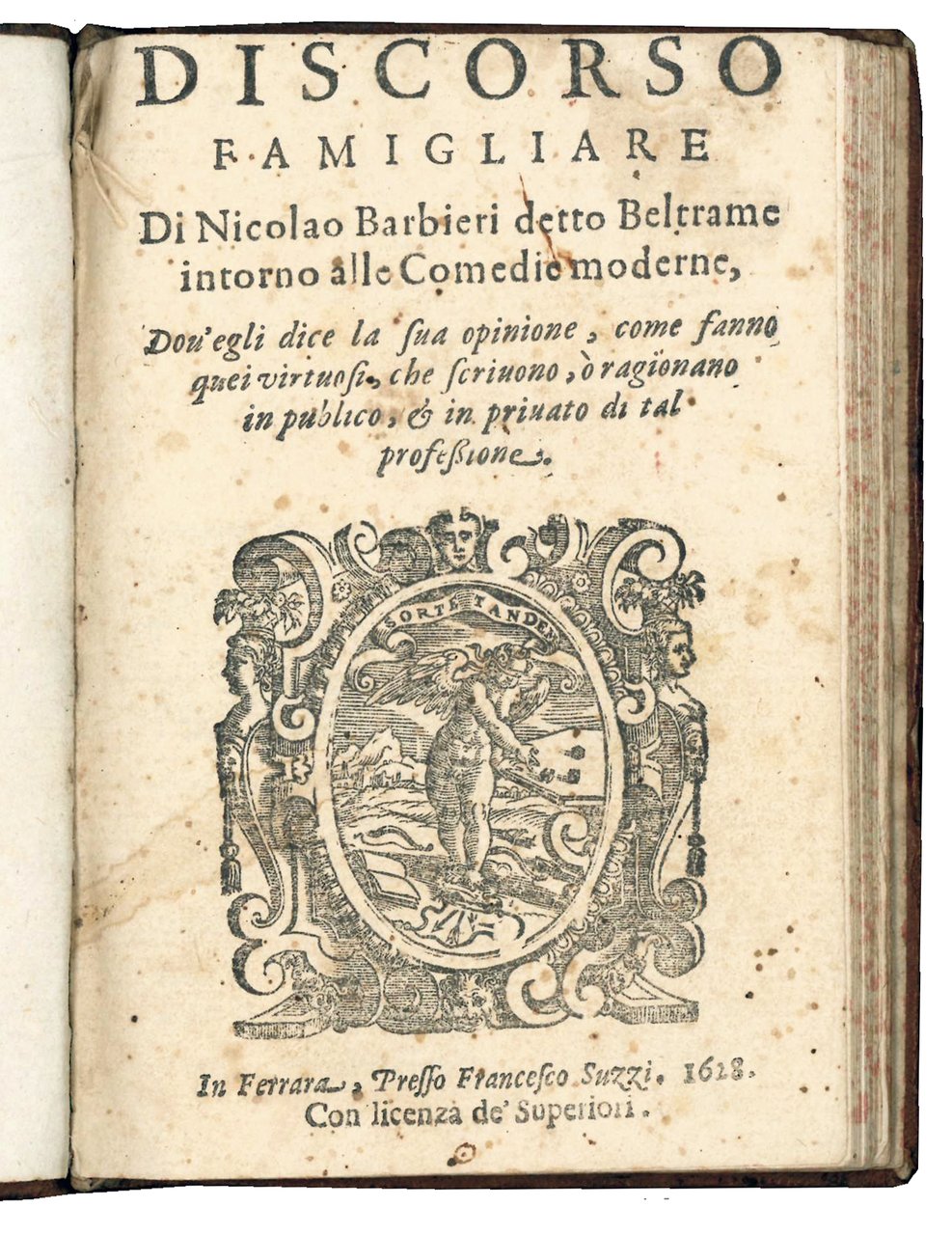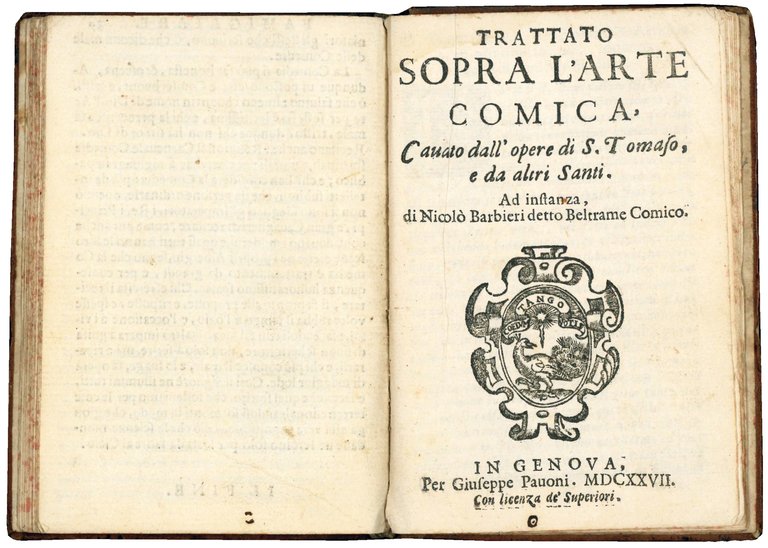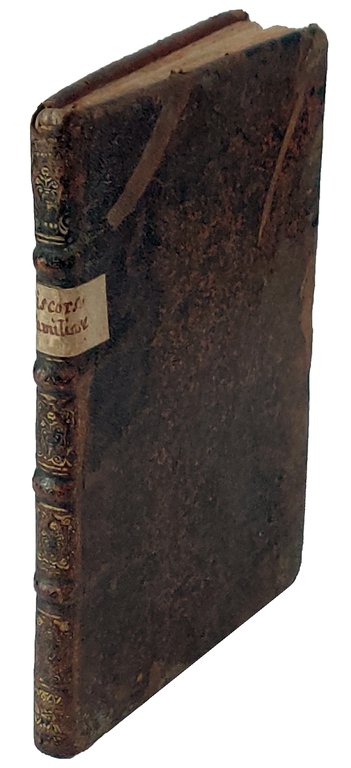Discorso famigliare di Nicolao Barbieri detto Beltrame intorno alle comedie moderne, dov'egli dice la sua opinione, come fanno quei virtuosi, che scrivono, o ragionano in publico, & in privato di tal professione
Discorso famigliare di Nicolao Barbieri detto Beltrame intorno alle comedie moderne, dov'egli dice la sua opinione, come fanno quei virtuosi, che scrivono, o ragionano in publico, & in privato di tal professione
Payment methods
- PayPal
- Credit card
- Bank transfer
- Pubblica amministrazione
- Carta del Docente
Details
- Year of publication
- 1628
- Place of printing
- Ferrara
- Author
- BARBIERI, Niccolò, called Beltrame (1576-1641)
- Publishers
- Francesco Suzzi
- Keyword
- seicento
- State of preservation
- Good
- Languages
- Italian
- Binding
- Hardcover
- Condition
- Used
Description
THE FIRST TWO NICCOLÒ BARBIERI'S WORKS ON THE COMMEDIA DELL'ARTE, EXTREMELY RARE
(Bound with:) BARBIERI, Niccolò, called Beltrame (1576-1641). Trattato sopra l'arte comica, cavato dall'opere di S. Tomaso, e da altri santi. Ad instanza, di Nicolò Barbieri detto Beltrame Comico. Genova, Giuseppe Pavoni, 1627.
Two works in one volume (138x95 mm). Discorso: 39, [1 blank] pp. Collation: A-B8 C4. Printer's device on the title page; Trattato: [8] leaves. Collation: A8. Printer's device on the title page. Contemporary brown calf, gilt spine with four raised bands, in the second compartment label with manuscript title “Discorso familiare”, sprinkled edges (slightly rubbed and worn). Upper margin cut short, first title page slightly soiled, some light staining, all in all a good copy.
Extremely rare first editions of the first two Niccolò Barbieri's publications on the Commedia dell'arte.
In defence of his own profession and the art of comedy in general, Barbieri first published the short Trattato sopra l'arte comica (Genoa, 1627) and, the following year, the Discorso famigliare intorno alle moderne comedie (Ferrara, 1628), which he dedicated to the King of France, Louis XIII. Written in response to a series of pamphlets (“libricciuoli”) against the comedians, the Discorso famigliare, reprinted at Milan in 1628, was very successful and widely distributed. It contains a wealth of information on the Commedia dell'arte, and is also of considerable importance for the study of morality in 17th-century theater. Together with G.B. Andreini and P.M. Cecchini, Barbieri was one of the first to dare to speak out in defence of an art that was unanimously considered to be diabolical, anticipating the many notable treatises which, in addressing the problem, made extensive use of Barbieri's work, both for its earlier date and for the undisputed validity of its arguments. In 1634, the treatise, corrected and revised by some scholars in Siena, was expanded and reprinted under the title La Supplica, discorso familiare (Venice, 1634 and 1636) (cf. A. Zapperi, Barbieri, Niccolò, in: “Dizionario biografico degli Italiani”, Rome, 1964, VI, p. 237, s.v.).
His “essay [Discorso famigliare] was a response to the Counter-Reformation Church and its condemnation of all theater, but especially of the Commedia dell'Arte, which was regarded as the most dangerous of all genres. In particular, Church authorities regarded with extreme disfavor the use of the mask - which in their view hid one's face from God - and the participation of women, considered sources of dishonesty and lasciviousness” (The Mazzoni Pamphlet Collection at Duke University, E.323.VIII).
As a result of the cultural hardening following the Council of Trent, there was a real mobilisation against professional comedians and “mercenary comedy” (as opposed to academic and cultivated comedy, conceived as a literary pastime), which took the form of a proliferation of moral treatises and a multiplication of sermons and openly hostile initiatives by the religious authorities. The contempt for the comedian and his profession, which was considered somewhere between a buffoon and a charlatan, made some great actors of the Commedia dell'arte rethink their social role and become more aware of their own cultural dignity.
The extent to which Barbieri felt this problem is shown by the series of works he devoted to defending the comedians: from the Trattato dell'arte comica (1627, reprinted as an appendix to La Supplica) to the Discorso famigliare (1628), from the prologue to the comedy L'Inavertito (1629) to the two editions of La Supplica (1634 and 1636), the first of which is the one in which the author's polemical points are best expressed, as they are somewhat softened in the later revision.
For Barbieri, comedy is important not only for its entertaining aspects, but also from an educational point of view, because it can express better than school theatre the multiform and articulated life in the cities, as well a



